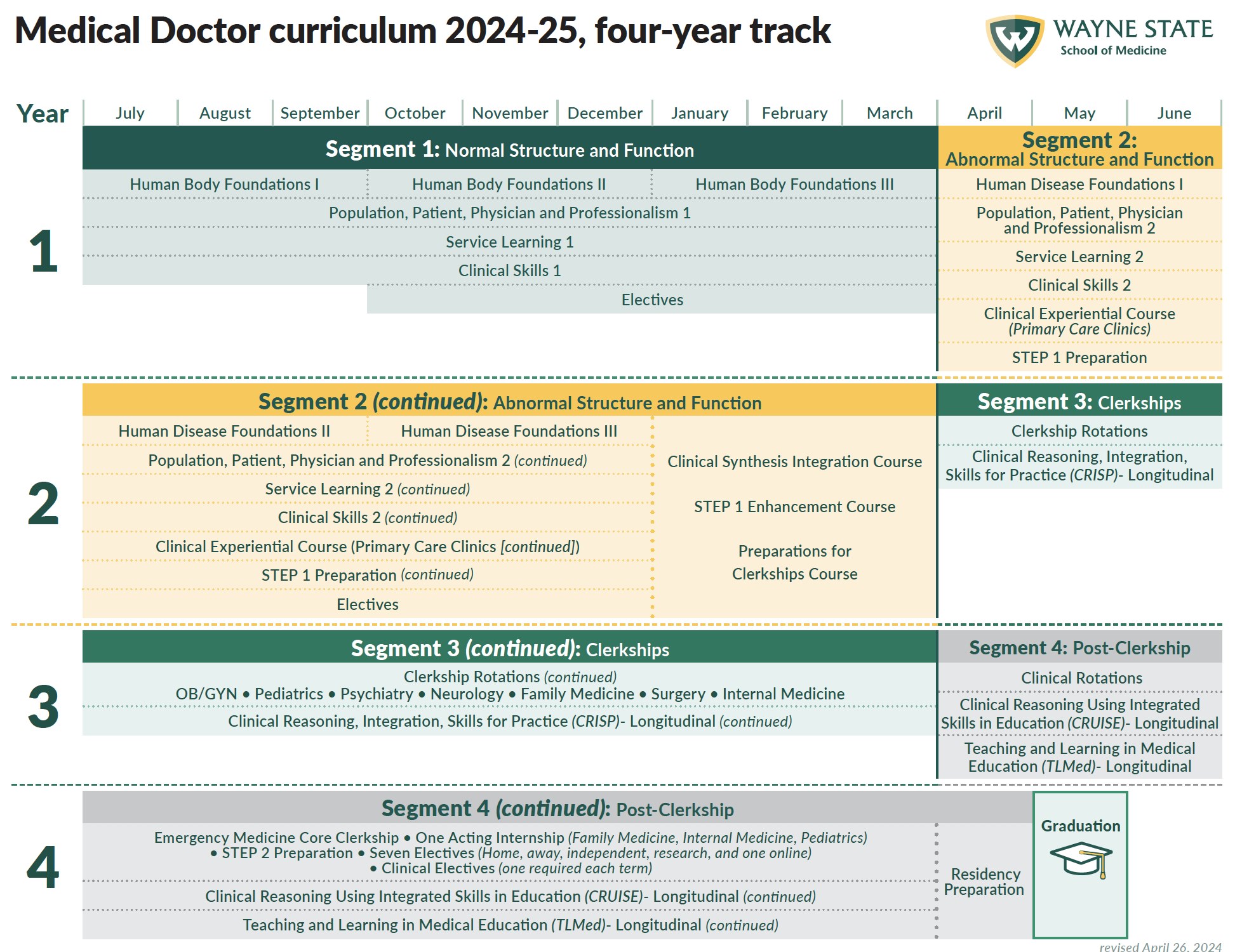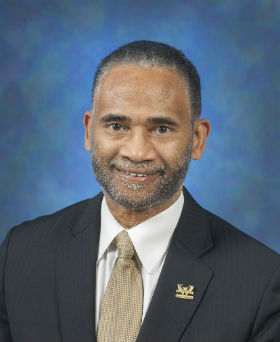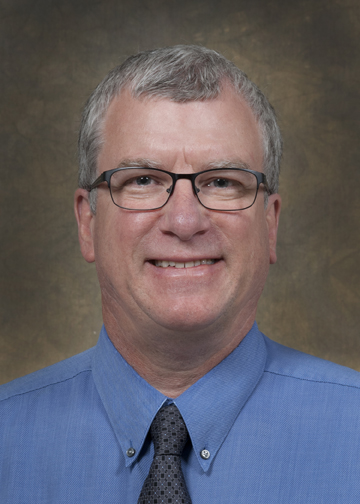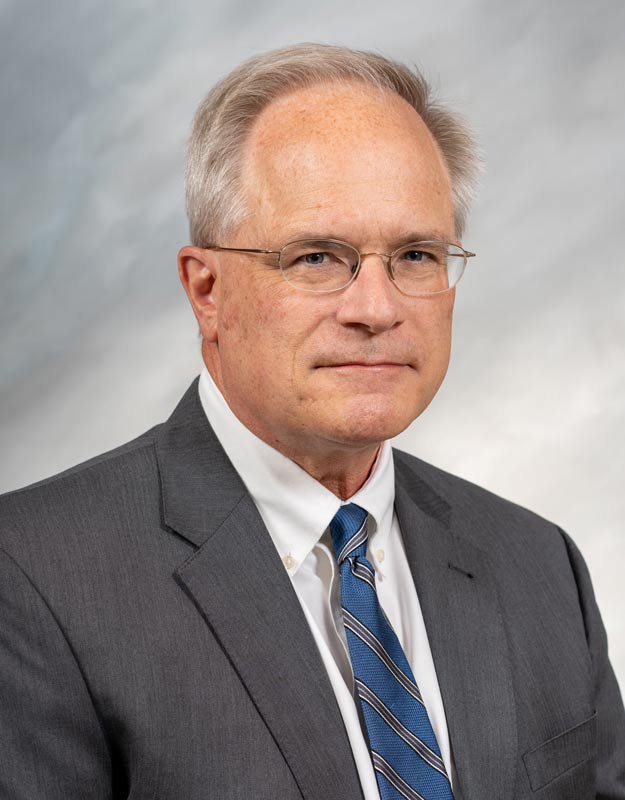Office of Undergraduate Medical Education and Curricular Affairs
Please allow us to (re)introduce you to the Office of Undergraduate Medical Education and Curricular Affairs (formerly titled Academic and Student Programs).
The Office of UME and Curricular Affairs is committed to supporting the Wayne State University School of Medicine’s educational mission. The mission of the office is to develop and graduate a diverse cadre of physician-leaders who are:
- Comprehensively educated to provide high-quality 21st century health care
- Uniquely trained to provide high-quality health care in a complex health system
- High in acuity
- Highly diverse
- Working in clinical and community environments
- In alignment with educational goals, understand and demonstrate social accountability in support of the priority health needs of the local, state and national communities they serve
This office is responsible for the design, development and implementation of the M.D. curriculum in Years 1-4 pictured below (also available as a PDF). The new name better encapsulates the primary function and purpose of the office.

This includes but is not limited to:
- Overseeing all medical student courses and clerkships
- The foundational science pre-clerkship curriculum
- The clinical science clerkship and post-clerkship curriculum
- The Kado Clinical Skills Center
- The Office of Medical Student Research
- The Office of Service Learning and Community Engagement
Availability and awareness of the senior associate dean and his team to student concerns

Dr. Richard Baker serves as the senior associate dean in charge of this office and oversees everything in Year 1 through 4 from the curriculum schema above. His office is located in 1207 Scott Hall. Dr. Baker regularly meets with students and student leadership. Students may schedule time to meet with Dr. Baker here.
 Dr. Paul Walker is the Segment 1 director and is responsible for Year 1 of the pre-clerkship curriculum. This includes, but not is limited to, M1 curricular design and content, M1 academic advising, and M1 assessment design and quality control. Dr. Walker regularly meets with students and student leadership, such as curriculum representatives and others. Students may schedule time to meet with Dr. Walker, and or reach out via email, at pdwalker@med.wayne.edu.
Dr. Paul Walker is the Segment 1 director and is responsible for Year 1 of the pre-clerkship curriculum. This includes, but not is limited to, M1 curricular design and content, M1 academic advising, and M1 assessment design and quality control. Dr. Walker regularly meets with students and student leadership, such as curriculum representatives and others. Students may schedule time to meet with Dr. Walker, and or reach out via email, at pdwalker@med.wayne.edu.
 Dr. Devibala Govindarajan is the assistant dean of Clinical Foundational Science and manages Year 2 of the pre-clerkship curriculum. This includes, but is not limited to, M2 course schedule and implementation, M2 curricular design and content, M2 academic advising, and M2 assessment design and quality control. Dr. Govindarajan regularly meets with students and student leadership, such as curriculum representatives. Students can schedule time to meet with Dr. Govindarajan, and or reach out via email, at drdevibala@wayne.edu.
Dr. Devibala Govindarajan is the assistant dean of Clinical Foundational Science and manages Year 2 of the pre-clerkship curriculum. This includes, but is not limited to, M2 course schedule and implementation, M2 curricular design and content, M2 academic advising, and M2 assessment design and quality control. Dr. Govindarajan regularly meets with students and student leadership, such as curriculum representatives. Students can schedule time to meet with Dr. Govindarajan, and or reach out via email, at drdevibala@wayne.edu.
 Dr. Christopher Steffes is the associate dean of Clinical Education and oversees the entire clerkship (Year 3) and post-clerkship (Year 4) curriculum. This includes, but is not limited to, clerkship and post-clerkship design and content, academic advising, and curricular design and content. Dr. Steffes regularly meets with students and student leadership such as campus representatives and others. Students can schedule time to meet with Dr. Steffes or reach out via email at csteffes@med.wayne.edu.
Dr. Christopher Steffes is the associate dean of Clinical Education and oversees the entire clerkship (Year 3) and post-clerkship (Year 4) curriculum. This includes, but is not limited to, clerkship and post-clerkship design and content, academic advising, and curricular design and content. Dr. Steffes regularly meets with students and student leadership such as campus representatives and others. Students can schedule time to meet with Dr. Steffes or reach out via email at csteffes@med.wayne.edu.
In addition, course directors meet with curricular representatives after each exam. The office also reviews courses in the curriculum monthly through the School of Medicine Curriculum Management Committee and its subcommittees. These subcommittees have student representatives with reserved agenda space and serve as another valuable avenue to hear feedback from our student body. Students are welcome to reach out anytime to mdcurriculum@wayne.edu with any curricular concerns.
Responsiveness to student concerns
The Office of UME and Curricular Affairs is committed to be available and responsive to student concerns. Recent improvements within the undergraduate medical education curriculum based on student concerns and feedback include:
- The implementation of the pre-clerkship student workload policy to ensure students have time for self-regulated, independent study and a manageable workload
- A new learning thread established in pre-clerkship that sets the stage for all evidence-based topics presented in the curriculum
- Uniformity within the curricular schedule in pre-clerkship on a week-to-week and term-to-term basis
- Having the academic schedule months in advance with the “Key Dates Flyers” in pre-clerkship
- Completely personalizing the Canvas Calendar to the individual schedule in pre-clerkship
- Movement from passive to active learning, where lectures do occur, are backed by multiple active-learning sessions
- Implementing a longitudinal Step prep course and orientation series to provide comprehensive support to students as they prepare for the USMLE Step 1 exam during the pre-clerkship phase
- To enhance students’ learning experience and success on the USMLE Step 1 exam, an innovative Advance Learning Strategies course has been introduced this year. The course aims to enhance student learning skills to become Master Adaptive Learners in a 360-degree supportive environment.
- Pre-Clerkship to Clerkship Transition Course added
- Change of length in clerkships
- Addition of Clinical Reasoning Using Integrated Skills in Education (CRUISE) course added
- Integrated ambulatory experience in all clerkships
- Moving graduation to May for the Class of 2025 to ensure ample time for post-graduation residency transition.
- Shortened M4 by one month while maintaining schedule flexibility
- Reengineered M4 in the quarter system by including longitudinal courses and making it possible for students to take two consecutive months of vacation, supporting preparation for Step 2 CK exam studying.
- Introduced competency-based evaluation in the new Acting Internship to help prepare students for residency
- Added robust residency preparation course as a requirement
- Continue to build in options and flexibility in M3 and M4 to support student experience and preparation
- Instituted M4 orientation day in 2024 to prepare students for senior rotations and residency application needs in addition to the longitudinal courses and financial challenges
- Enhanced multi-layered communication across the curriculum such as “Weekly Snapshot” emails in pre-clerkship, monthly newsletters in clerkship and post-clerkship
The above tangible changes have occurred because the office is aware of, and responsive to, student concerns, and operates with a continuous quality improvement mindset to deliver the best medical education consistent with the latest evidence-based practices.
Contact information
The Office of UME and Curricular Affairs, located in Suite 310 of the Mazurek Medical Education Commons, is open and staffed Monday through Friday from 8:30 a.m. to 5 p.m.
Students are always welcome to check out our website for more information and/or email questions they have regarding curricular concerns to mdcurriculum@wayne.edu
Conclusion
The reintroduction of the Office of UME and Curricular Affairs Office marks a significant step forward in our commitment to providing excellence in medical education. By combining academic and curriculum-related functions, we aim to enhance the student experience, foster collaboration and drive continuous educational improvement.
We hope you enjoyed this issue of In the Loop. You can have your voice heard by submitting questions or comments via the Warrior Med Suggestions Program. You are free to include your name and contact information or to remain anonymous.
All issues of In the Loop can be found on the Office of Assessment, Accreditation and Continuous Quality Improvement website.
Sincerely,
Kanye Gardner
Director of Continuous Quality Improvement
Office of Assessment, Accreditation and Continuous Quality Improvement



 Dr. Paul Walker is the Segment 1 director and is responsible for Year 1 of the pre-clerkship curriculum. This includes, but not is limited to, M1 curricular design and content, M1 academic advising, and M1 assessment design and quality control. Dr. Walker regularly meets with students and student leadership, such as curriculum representatives and others. Students may schedule time to meet with Dr. Walker, and or reach out via email, at
Dr. Paul Walker is the Segment 1 director and is responsible for Year 1 of the pre-clerkship curriculum. This includes, but not is limited to, M1 curricular design and content, M1 academic advising, and M1 assessment design and quality control. Dr. Walker regularly meets with students and student leadership, such as curriculum representatives and others. Students may schedule time to meet with Dr. Walker, and or reach out via email, at  Dr. Devibala Govindarajan is the assistant dean of Clinical Foundational Science and manages Year 2 of the pre-clerkship curriculum. This includes, but is not limited to, M2 course schedule and implementation, M2 curricular design and content, M2 academic advising, and M2 assessment design and quality control. Dr. Govindarajan regularly meets with students and student leadership, such as curriculum representatives. Students can schedule time to meet with Dr. Govindarajan, and or reach out via email, at
Dr. Devibala Govindarajan is the assistant dean of Clinical Foundational Science and manages Year 2 of the pre-clerkship curriculum. This includes, but is not limited to, M2 course schedule and implementation, M2 curricular design and content, M2 academic advising, and M2 assessment design and quality control. Dr. Govindarajan regularly meets with students and student leadership, such as curriculum representatives. Students can schedule time to meet with Dr. Govindarajan, and or reach out via email, at  Dr. Christopher Steffes is the associate dean of Clinical Education and oversees the entire clerkship (Year 3) and post-clerkship (Year 4) curriculum. This includes, but is not limited to, clerkship and post-clerkship design and content, academic advising, and curricular design and content. Dr. Steffes regularly meets with students and student leadership such as campus representatives and others. Students can schedule time to meet with Dr. Steffes or reach out via email at
Dr. Christopher Steffes is the associate dean of Clinical Education and oversees the entire clerkship (Year 3) and post-clerkship (Year 4) curriculum. This includes, but is not limited to, clerkship and post-clerkship design and content, academic advising, and curricular design and content. Dr. Steffes regularly meets with students and student leadership such as campus representatives and others. Students can schedule time to meet with Dr. Steffes or reach out via email at